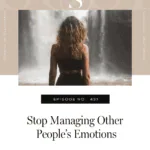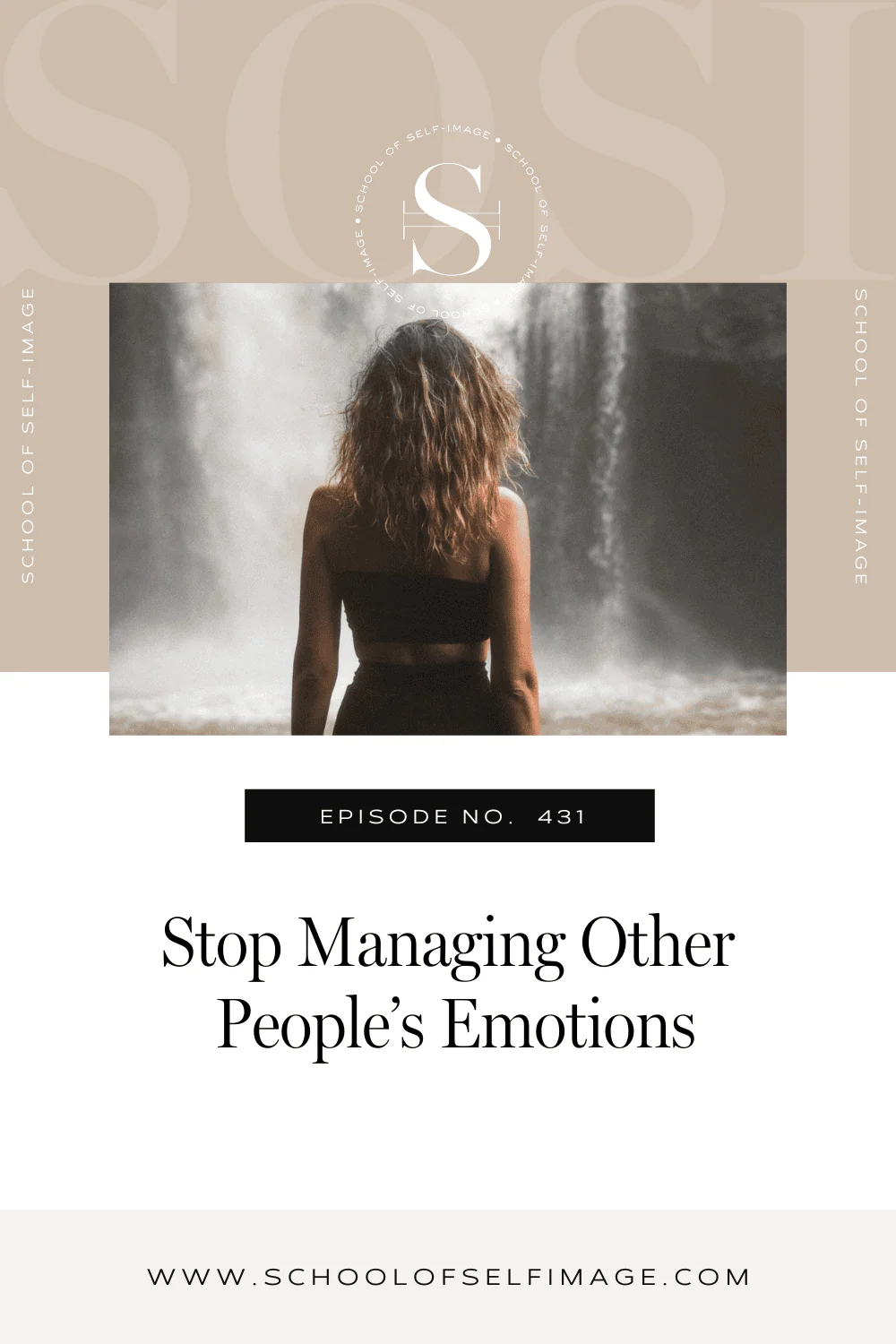

The Power of Setting Boundaries and Trusting Yourself
Managing other people’s emotions is a common behavior that many individuals engage in, often intending to maintain harmony and avoid conflict. However, this habit can lead to significant negative consequences, including emotional exhaustion, resentment, and stifled personal growth for yourself and those around you.
Tonya Leigh explores the detrimental habit of managing other people’s emotions and how it impacts our personal happiness and growth. She discusses the importance of breaking free from the need to control how others feel, emphasizing that this behavior stifles both personal and collective development. Tonya shares her recent experience with guided visualization walks, which she refers to as immersion walks, and how they have positively shifted her energy and focus on vibrant well-being. By incorporating practices like Pilates, meditation, and self-care, she reveals how she is reclaiming her health and happiness.
Join Tonya as she dives into strategies for cultivating emotional independence and nurturing your own well-being.
Episode Details:
00:49 – Tonya’s Self-Care Routine
02:15 – The Cost of Controlling Emotions
06:10 – Fear of Being the Bad Guy
09:02 – Loss of Self-Trust
12:27 – Self-Image and Managing Emotions
14:54 – Creating Your Own Safety
17:55 – Types of Emotional Management
23:28 – How to Stop Managing Emotions
25:17 – Setting Boundaries Without Guilt
25:50 – Building Emotional Resilience
Useful Resources:
- Click HERE to join the Membership
- Click HERE for a FREE download
- Click HERE to sign up for our weekly newsletter, The Edit
Connect with Master Life Coach Tonya Leigh:
- Click HERE to follow our Instagram
- Click HERE to visit our website
- Click HERE to visit our Facebook group
- Click HERE to follow our TikTok
- Click HERE to subscribe to our YouTube channel
Episode Transcript
Do you ever feel like your happiness depends on how others feel? You’re constantly adjusting, soothing, or avoiding conflict just to keep the peace? If so, you’re not alone. Many of us have been conditioned to believe that it’s our job to manage other people’s emotions. But what if I told you that this habit is costing you more than you realize. That by trying to control how other people feel, you’re actually limiting their growth, your growth, draining your own energy, and keeping yourself stuck. Well, that’s what we’re talking about in today’s episode. So let’s dive in.
Welcome to the School of Self-Image, where personal development meets style. Here’s your hostess, master life coach, Tonya Leigh.
What’s happening, gorgeous friends. I just came back from the most glorious walk. One of the things that I have been incorporating into my routine are guided visualization walks. I like to call them immersion walks, where I immerse myself in a whole new realm of possibility. These are visualizations that I actually created for myself. So it’s a little interesting hearing myself talk to myself as I walk. But I will tell you, they are shifting my energy in ways I have not experienced in such a long time. And not only that, my focus this year is on vibrant well-being, which is one of the paths of the School of Self-Image. And so doing that along with Pilates, along with moments of meditation throughout my day, which is great food, lots of water, I’ve been getting out in the sunshine.
I am feeling like a whole new person, feeling so good. I’m so excited because last year I got into a habit of putting some of my self-care on the back burner, especially towards the end of the year. And so it has just felt so good to return to this place of just exquisite, self-care. And do you know how else I’ve been taking care of myself? By not trying to control other people’s emotions. And that is what we’re talking about today. I want to challenge you to stop managing other people’s emotions. This is something I coach around a lot because I get it. If the world would just behave the way we want it to, it would be so much better, or at least that’s what we tell ourselves and that’s why we go around trying to manage our children’s emotions, our partner’s emotions, our client’s emotions.
We are just over here managing everybody else’s emotions. But you know what’s really interesting about that? The reason why we do this is because we don’t understand how to manage our own emotions. And so if we can just get everybody else to behave a certain way, we don’t have to deal with the discomfort within ourselves. So I want us to really look at the reason why we try to manage people’s emotions. The first thing is we mistake discomfort for a problem that needs solving. So our brains interpret discomfort as danger, and so we need to fix it in order to not be in danger. But the reality is discomfort is just a part of life. It’s just energy moving through our bodies. And in order to live a beautiful life, you need to be willing to feel some discomfort because you need to be able to experience contrast in life.
How will you appreciate joy when you don’t understand sadness? I think about this as a parent. Oftentimes we don’t want our kids to feel sadness or rejection or disappointment, so we’re always trying to protect them, but that is how they learn. That’s how they understand what one emotion feels like so that they can appreciate another. But we’ve been conditioned to believe that negative emotions are emergencies and that our job is to fix them ASAP. Emotions are not problems. They’re just temporary experiences and people are capable of handling their own emotions, even children. When you hold space for them, when you care for them, when you love them through it, they can handle a negative emotion. In fact, usually they react to it.
They might have a little temper tantrum. The next thing you know they’re playing again, and adults for sure are capable of handling discomfort. So here’s the shift that I want you to consider. Letting someone sit with their discomfort is not cruel. It’s allowing them to build emotional resilience. The second reason why we try to manage other people’s emotions, and this is a big one, is that we fear being rejected or alienated. Humans are wired for belonging. In the past, being cast out of the group could mean literal survival danger. While that’s no longer the case, our nervous system still perceives disapproval as a threat. So we avoid saying no because we don’t want to disappoint people. We shape-shift our personality to be more likable.
We sugarcoat the truth so that we don’t ruffle any feathers, and this fear of rejection keeps us over accommodating people at the expense of our own well-being. Here’s the shift if you find yourself people-pleasing and trying to control other people’s emotions because you’re afraid of being rejected. True belonging doesn’t come from keeping everyone happy. It comes from being unapologetically yourself and trusting that the right people will love and accept you. The third reason why we try to manage people’s emotions is that we don’t want to be seen as the bad guy or the bad girl. One of the hardest parts of setting boundaries is dealing with people’s reactions because saying no might make someone disappointed. Speaking your truth might make someone uncomfortable.
Standing firm might make someone upset with you. And for people pleasers, this is the ultimate, ultimate nightmare because we’ve been trained to believe that if someone is unhappy, we did something wrong. But the new shift is people are allowed to be upset. It doesn’t mean you did anything wrong. The fourth reason why we often try to manage people’s emotions is that we were raised to be peacekeepers. So for many of us, managing emotions isn’t just a habit, it’s an identity. If you grew up in a home where conflict was uncomfortable or unpredictable, you may have had to learn to become the fixer, and it makes so much sense, right? Your literal survival instinct kicked in and said, “I need to learn how to keep the peace in order to be safe.”
If you had an emotionally volatile parent, you might’ve taken on the role of calming them down to keep the peace. If you were praised for being so easygoing and so thoughtful, you might have internalized the idea that your worth comes from making other people feel good. So here is a new perspective for you if this is why you find yourself managing other people’s emotions. Being thoughtful is a beautiful trait, but it doesn’t have to mean taking responsibility for everyone’s feelings. Now, the fifth reason why we often manage people’s emotions is that we overestimate our influence. Managing people’s emotions isn’t just about avoiding discomfort. It’s also a form of control.
You think, “If I say it this way, maybe they won’t be upset, or, “If I keep the peace, I won’t have to deal with this anger.” But people’s emotions are shaped by their own thoughts, their own experiences, not by your every move. So if you find yourself thinking that you have that much control, here is the new perspective. You are not a puppet master. People’s reactions belong to them. But now let’s talk about the cost of managing people’s emotions. Number one, emotional exhaustion. Trying to keep everyone happy is a full-time job that you do not get paid for. Also, the loss of self-trust. Imagine that you are using Google Maps to navigate to some place, but every time it gives you directions, you second-guess it.
You ask a passenger, “Are you sure this is the right way?” Or you reroute based on what looks familiar, even if you don’t actually know, you stop at every turn to get opinions from strangers. Eventually, you stop trust in the map altogether, even though it was designed to guide you. This is what happens when you constantly prioritize other people’s emotions over your own. Instead of following that internal inner GPS system that’s there to guide you, you are relying on external validation, and over time you lose confidence in your own judgment because you have been conditioned to check in with everyone else first and their emotions. But the truth is your inner GPS is reliable, but you have to stop overriding it with other people’s opinions and feelings.
You have to learn to trust yourself. The other cost of managing people’s emotions is the resentment that it causes. I’ve personally experienced this one. Over time, you start to resent the very people that you’re trying to keep happy. And the reality is it was your fault. And I don’t say that for us to self-blame, but for us to take responsibility and accountability for our own lives and our own emotional state. The resentment is towards yourself because you know deep down that you allowed this to happen. But that’s what happens when you try to manage other people’s emotions. You don’t speak up, you don’t set boundaries and then one day you wake up and you’re just pissed.
You’re like, “God, how did I get myself into this situation?” And you got yourself into that situation because you were afraid, and that’s okay. But recognizing it and having the courage to be true to yourself is where you begin to turn your life around. The other cost of managing people’s emotions is stifled growth. You’re so busy keeping people comfortable that you forget to prioritize your goals, your needs, your vision. And then finally, you keep other people from growing. When you shield people from their emotions, you rob them of the chance to develop their own resilience, their own confidence, their own emotional intelligence. Maybe you deny them the opportunity to look at patterns that may be holding them back.
It’s actually a disservice to manage other people’s emotions. So the truth is, no amount of emotional management will ever create true peace. Have you ever had that experience of needing to have a difficult conversation and you don’t want the other person to be upset, and so you just avoid it? You turn away from it and it just makes the problem worse. But the moment you have it, the moment you muster up the courage to go and sit down and just be honest and maybe set a boundary, you feel this deep sense of relief and this peace that just comes over you. If you’ve ever experienced that, I want you to remember that experience because that’s what it’s like when you stop trying to manage other people’s emotions.
You get to experience true peace. Now, inevitably, whenever I’m thinking about any concept, I always bring it back to self-image. Who do you need to become to stop managing other people’s emotions? Because breaking this habit isn’t about what to do. It’s about how to see yourself so that doing what you need to do just becomes easier. If you want to stop micromanaging how other people feel, you really have to step into a new identity. And here’s how you need to see yourself in order to do this. First of all, you need to see yourself as a person who trusts others to handle their own emotions. Instead of thinking, “I have to fix this” shift to “I trust people to handle their own emotions even when it’s uncomfortable” or “Their feelings are theirs to process, not mine to fix.”
And if you want to think about a mantra here, it could be “I’m not responsible for how others feel. I am responsible for my truth.” But in order to do that, you also have to see yourself as a woman who’s able to handle her own emotions. And this is often why we try to manage everybody else’s because we haven’t done the work of managing our own. But when you learn to sit with discomfort, you learn that it’s not a death sentence. You learn that it’s not going to harm you. It’s just an energy, a vibration moving through your body. And when you learn how to sit with your own discomfort and on top of that, you grow from sitting with your own discomfort, then you don’t feel this compulsion to try to fix other people’s discomfort because you understand the gold that comes from being able to do this.
And nobody can do that if you’re always fixing things for them. It’s like you’re stealing a growth opportunity every time you try to fix their emotional life and this especially happens with our children. And I’m raising my hand over here. I’ve done this many times. I didn’t want to see my baby sad. I didn’t want to see her upset. And every time I try to fix it for her, I was robbing her of an opportunity. So now I’ve learned it’s okay for her to be upset. This is how she learns. This is how she grows. This is how she becomes stronger, tougher. This is how she handles the world. But I had to learn how to sit with my own discomfort in order to be that her. Another way that your self-image may need to shift in order to stop managing people’s emotions is that you need to see yourself as a person capable of creating your own safety in the midst of other people’s discomfort.
Now, this is especially difficult if you have been physically harmed, if you have experienced trauma from other people’s negative emotions. And this is where you may need to set some very strict boundaries, remove yourself from someone’s presence and seek counsel, seek whatever you need to seek to provide your own safety. But I’m speaking to the people who just feel unsafe when someone’s upset and just maybe articulates that to them, maybe visibly, you can tell they’re just disappointed. You can create your own safety in that. You don’t have to fix that for them in order for you to feel safe. All you need to do is to remind yourself that I create my own safety.
It is safe to feel negative emotion, and I am going to allow them to have this experience, and I’m going to be over here sitting with my own discomfort because chances are you’re going to feel discomfort when other people are feeling it. So you process your discomfort and allow them to process theirs. And then another way that your self-image may need to shift in order to stop managing other people’s emotions is to really see yourself as a person who stands in her truth and lets others react how they will. You no longer over explain yourself. You don’t seek validation for your choices. You understand that someone else’s reaction doesn’t define you.
And you literally begin to walk through the world with the mantra of I speak my truth with confidence and I let other people have their emotions and their opinions about it. And then finally, this is a big one, but your self-image may need to shift to being a person who sees boundaries as an act of love, not rejection. Oftentimes, people pleasers especially fear setting boundaries because they worry it’s going to push people away. But in reality, boundaries create healthier relationships. When you stop managing people’s emotions, you attract people who respect you. When you stop over giving, you allow space for reciprocity. When you honor yourself, you teach others how to honor you too. And so your boundaries don’t push people away.
They invite the right ones closer so that you can have healthier connections. Now, before I tell you how to stop managing other people’s emotions, I want to share three types of emotional management that I have noticed and why they’re ridiculous. So the first one is one-to-one, trying to control someone else’s behavior so that you feel better. This is when you bend to over backwards to avoid conflict, to keep people happy and to dodge emotional landmines, right? So it’s this one particular person that you are constantly trying to manage. It could be your child, it could be your friend, it could be your husband, it could be your wife, it could be your boss, but you’re trying to manage one person’s behavior.
It could look like you not telling your best friend the truth because you don’t want them to be upset or you downplay your success with one particular person because you don’t want her to feel jealous. Or maybe it’s you tiptoeing around your husband because you don’t want to add stress to his life, but in the meantime, you’re not being honest with him about how you’re feeling and what your needs are. So one-to-one, the other one which is really interesting is what I call triangulation. And this is where you manage one person to control another’s reaction. Ladies, this is when we are kicking our partner under the table when we are at a group event. I know I’m talking to some of y’all because I have done that myself.
I’m like, “Oh my God, I can’t believe you just said that.” And you’re kicking them under the table. And this is something that I have worked on a lot because I realize the reason why we do this is a couple of things. Number one, in some way, you feel like your identity is tied to that person and so you want to look good. So you think they need to be a certain way in order for you to look good. So you’re trying to manage their behaviors so that other people see you a certain way. And then the other one is I think you just are afraid of being kicked out of the group. So if your child or your partner is behaving a certain way and you’re over there trying to manage it in order for someone else to feel a certain way, you have this deep fear of I’m going to be kicked out of the group.
Now, this is very different then parenting your child and knowing what is a clear boundary, the values you want to instill in your child, and doing it out of that energy, not doing it to control other people’s emotions. And the same in a relationship. If someone’s crossing a boundary and they are just out of line and you’re like, “This doesn’t align with how I want to live my life.” A conversation probably needs to be had with that person. But if you’re doing it simply because you are afraid of other people being uncomfortable, that’s very different. I saw this recently with some friends of mine. We were all out to dinner, and my friend’s fiance was just out of character. He wasn’t saying much. He wasn’t being really present.
And I watched her as she’s trying to get him to participate in the conversation, and they’re over there whispering. And I heard her once say, “What’s wrong with you? What’s going on?” It occurred to me she was trying to get him to be a certain way for us. The reality is we didn’t care. Maybe he was tired, he’d worked that day. Maybe he was stressed, he had something on his mind. I didn’t care. Now, if he had been acting in a way that overstepped a boundary, I would’ve taken care of that for myself. But it just made me really sad for my friend that she couldn’t relax, that she was so worried about what we would think, that she wasn’t able just to let him be and just enjoy us and let him go to sleep at the table if he needs to.
But this is what we do, that triangulation of trying to manage someone’s emotions so that another person or group of people feel a certain way. And then the final one is one to many, trying to keep a whole group happy. And let me tell you, that is a recipe for disaster. It is the ultimate juggling act, trying to please everyone. Keeping all reactions in check, avoiding any negative feedback. This is the leader who makes decisions based on the approval of everyone rather than the truth. This is the public figure who obsesses over every comment instead of standing in their message. This is the woman who morphs into different versions of herself depending on who she’s with.
And this will keep you so disconnected from yourself because you can’t please everyone. You just can’t. Everybody comes to the table with their own values, their own perception of the world, their own experiences. There are going to be some people that just don’t like you. And so if you’re over there spending all of your time trying to get them to like you, what about all these people over here who are missing out on the true you? And so the reality is, no matter what you do, somebody’s not going to like it. So you might as well be the version of you that you love. I’m going to repeat that. Be the version of you that you love and you will attract the right people.
So how do we stop managing other people’s emotions? First of all, you need to build awareness. Notice when you’re adjusting yourself to keep someone comfortable, notice when you are not speaking up, when you’re holding back, when you are trying to talk them down from emotion and ask, am I doing this to avoid discomfort? Another great question is, would I still act this way if I wasn’t afraid of their reaction? That can be a very revealing question for you. Step two is to care without controlling. This is where most people get stuck. We believe that caring means taking responsibility for how others feel, but there’s a huge difference between caring versus controlling.
Care says, “I’ll support you, but I trust you to handle your emotions.” Control is “I need to fix your feelings so that I can feel okay.” Care is “I respect you enough to be honest with you.” Control is “I’m going to soften the truth so that you don’t feel bad.” Care is “I can hold space for your feelings, but I don’t need to take them on as mine.” Control is “If you’re upset, I have to make it better.” So care is offering support without trying to engineer someone else’s emotions. So instead of saying, “I don’t want them to be upset,” start to say, “It’s okay if they are.” Instead of thinking, “I don’t want them to think I’m a bad person,” begin to think, “Their perception of me is theirs to manage.”
Instead of thinking, “I just want to keep the peace.” You need to remind yourself that true peace comes from honesty, not emotional micromanagement. Step three, set boundaries without guilt. Other people’s expectations are not your responsibility. Other people’s disappointment is not your fault. Boundaries allow healthy relationships to flourish, and they also cause the unhealthy ones to go away. Step four, stop over explaining. No is a full sentence. You do not have to justify your decisions. And then step five is build emotional resilience. The more you sit with discomfort, the easier it gets. Now at first, it’s going to feel weird. You’re going to want to soften your truth. You’re going to want to over explain or backtrack.
Don’t just sit with the discomfort, because I promise you, the more you sit with it, the easier it becomes for you to allow others to feel it because you realize we’re all getting stronger together. At the end of the day, I want you to know this. Managing other people’s emotions is not your job. Being the fullest, most authentic version of you. That is your job. When you stop over explaining, over apologizing, over functioning for others, you gain something so valuable. You gain self-trust, you gain the sense of freedom to be who you are and the ability to attract the right people into your life.
Because the truth is the people who generally respect you don’t need you to shrink, soften, or sacrifice yourself to make them comfortable. So what if today was the day that you decided to let people feel however they need to feel and simply be you? No more walking on eggshells, no more emotional, micromanaging, just full, unapologetic, magnetic you. Because that version of you, she’s unstoppable. Have a beautiful, beautiful week, my friends and I will see you on next week’s episode. Cheers.




